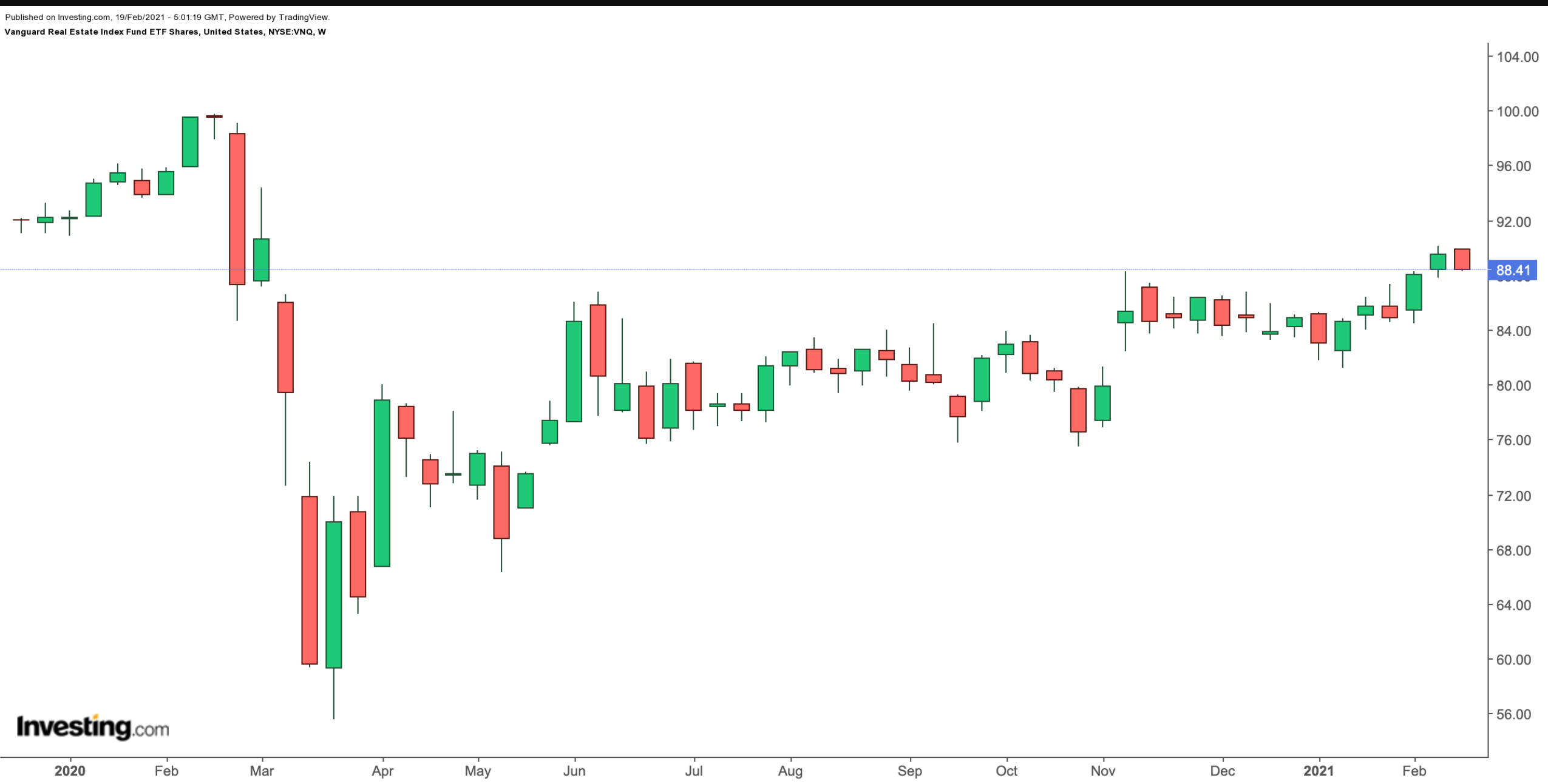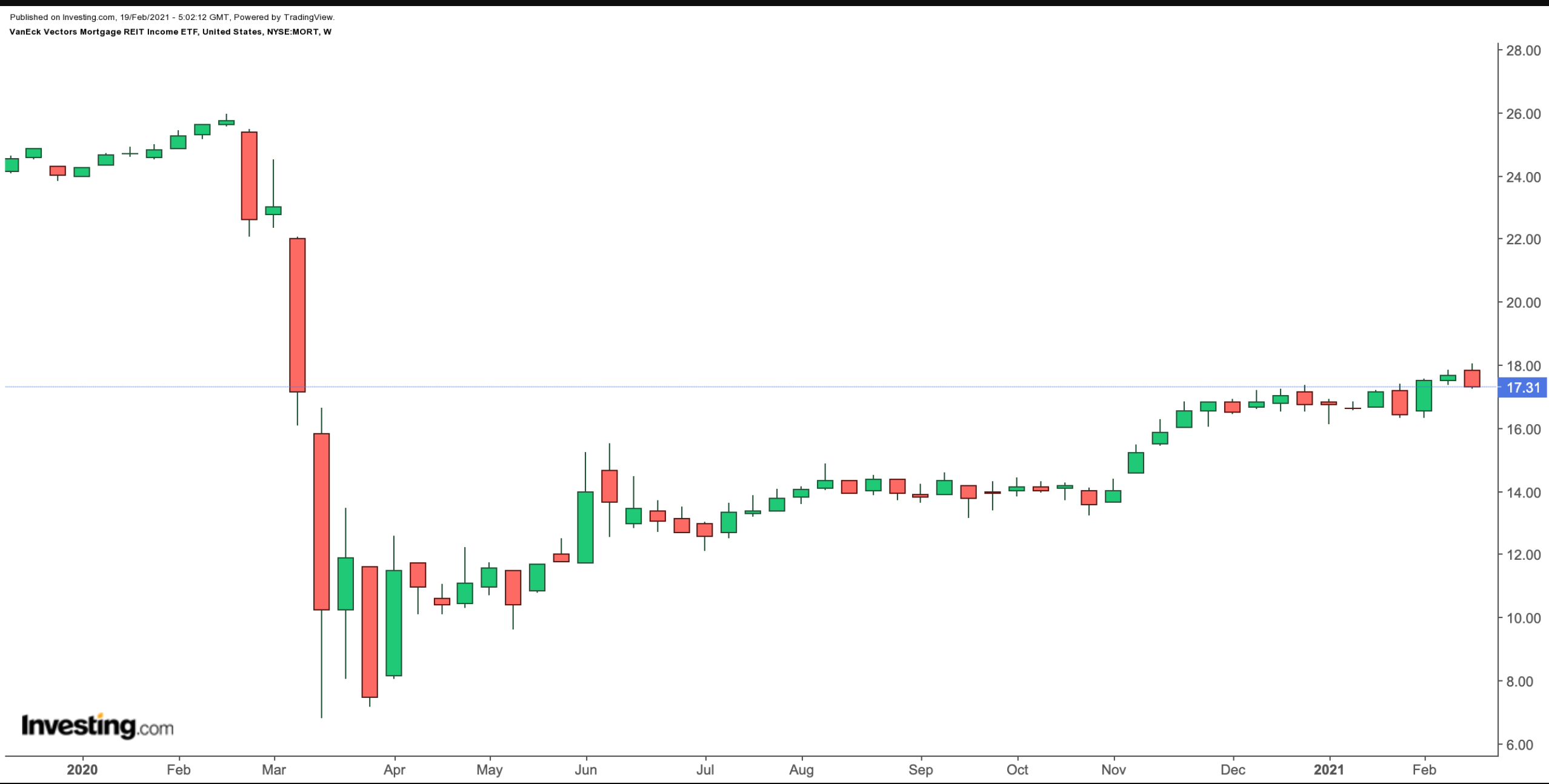Real estate is one of the most important sectors of the US economy, and Real Estate Investment Trusts (REITs) typically get significant investors attention. In the US, regulations require REITs to distribute 90% of their annual taxable income through dividend payments. Therefore, they tend to be a popular asset class among passive-income seekers.
The current monetary environment supported by the Fed typically favors REIT investments. Record-low interest rates mean lower borrowing costs for REITs, which can expand operations by developing or purchasing more real estate.
We recently covered the iShares Residential and Multisector Real Estate ETF (NYSE:REZ). Today, we'll discuss two other ETFs that could be of interest to readers.
1. Vanguard Real Estate ETF
- Current price: $88.41
- 52-week range: $55.58 - $99.72
- Dividend yield: 3.72%
- Expense ratio: 0.12% per year
The Vanguard Real Estate Index Fund ETF Shares (NYSE:VNQ) invests in publicly traded equity real estate investment trusts (REITs). Since its inception in September 2004, net assets have grown to $61.5 billion. It is one of the largest and most widely-followed real estate ETFs.

VNQ, which tracks the returns of the MSCI US REIT, has 174 holdings. The top three sectors of the fund include specialized REITs (38.9%), residential REITs (13.6%), industrial REITs (11.0%), retail REITs (9.3%), and health care REITs (8.8%). Specialized REITs typically invest in telecommunications and data center spaces, recent growth sub-sectors.
The ten largest holdings constitute over 46% of that assets. In other words, the ETF is heavily weighted in those stocks whose performance might affect VNQ. The top five names are the Vanguard Real Estate II Index Fund (NASDAQ:VRTPX), American Tower (NYSE:AMT), Prologis (NYSE:PLD), Crown Castle International (NYSE:CCI) and Equinix (NASDAQ:EQIX).
In the past 12 months, VNQ declined by almost 10%. But, year-to-date, it has returned 5.4%. We like the sub-sectoral diversity offered by the fund and would look to buy the dips in price.
2. VanEck Vectors Mortgage REIT Income ETF
- Current Price: $17.31
- 52-Week Range: $6.80 - $25.94
- Dividend Yield: 7.68%
- Expense Ratio: 0.41% per year
The VanEck Vectors Mortgage REIT Income ETF (NYSE:MORT) provides exposure to US mortgage REITs, also referred to as mREITs.

Recent research by Eva Steiner of Cornell University highlights:
"Mortgage REITs (MREITs) are specialized investment vehicles that invest in whole mortgages and/or mortgage-backed securities (MBS). They represent an important source of credit in the US mortgage market."
National Association of Real Estate Investment Trusts (NAREIT) points out mREITs "help finance 1.8 million homes in the US." Mortgage REITs typically lend money to real estate owners (or operators) through mortgages or MBS, which finance real estate transactions.
Earnings of mREITs are generated primarily through the spread between the interest earned on mortgages given out and the cost of funding these loans. When this net interest margin comes under pressure, shares of mREITs typically suffer. Many investors find mREITs appealing as they tend to have high dividends.
MORT, which has 25 holdings, tracks the returns of the MVIS® US Mortgage REITs Index (MVMORTTG). The fund started trading in August 2016 and net assets under management stand at $261.5 million.
Annaly Capital Management (NYSE:NLY), AGNC Investment (NASDAQ:AGNC), Starwood Property Trust (NYSE:STWD), and Hannon Armstrong Sustainable Infrastructure Capital (NYSE:HASI) lead the names in the roster.
Investing in mortgage REITs can be rewarding in terms of high dividend yields. However, Wall Street offers no free lunches, there could also risks in the months ahead. In 2020, the Federal Reserve (Fed) purchased over $1 trillion in mortgages from mREITs and banks. Most analysts agree that with Fed's purchase, the industry would have had a very difficult time. President Biden has also extended the eviction moratorium through June 30.
This recent move by the administration was seen as a positive move for the sector. Otherwise, homeowners currently in forbearance might have been moved to delinquency in April, potentially creating a domino effect on the availability of credit in the mortgage market. Mortgage giants Federal Home Loan Mortgage Corporation, known as Freddie Mac (OTC:FMCC), and Federal National Mortgage Association, known as Fannie Mae (OTC:FNMA), typically guarantee many of these mortgages.
It is too soon to know how the economy and the housing market will fate in the summer months. In the case of increased delinquencies, both Freddie Mac and Fannie Mae could incur liquidity drawdowns. Then, a significant number of mREITs might also find themselves in a difficult financial position. So, in the months ahead, there could be increased risks in the mortgage market.
Over the past year, MORT is down over 31%, but returned close to 5% since the start of 2021. Passive-income seekers who do not expect heightened risk in the mortgage market (such as a liquidity crisis) might consider investing in MORT around these levels.
Which stock to consider in your next trade?
AI computing powers are changing the Canadian stock market. Investing.com’s ProPicks AI are winning stock portfolios chosen by our advanced AI for Canada, the US, and other exciting markets around the globe. Our top strategy, Tech Titans, nearly doubled the S&P 500 in 2024 - one of the most bullish years in history. And Beat the TSX, designed for broad market exposure, is showing +878% gains with 10 years’ back-tested performance. Which Canadian stock will be the next to soar?
Unlock ProPicks AI